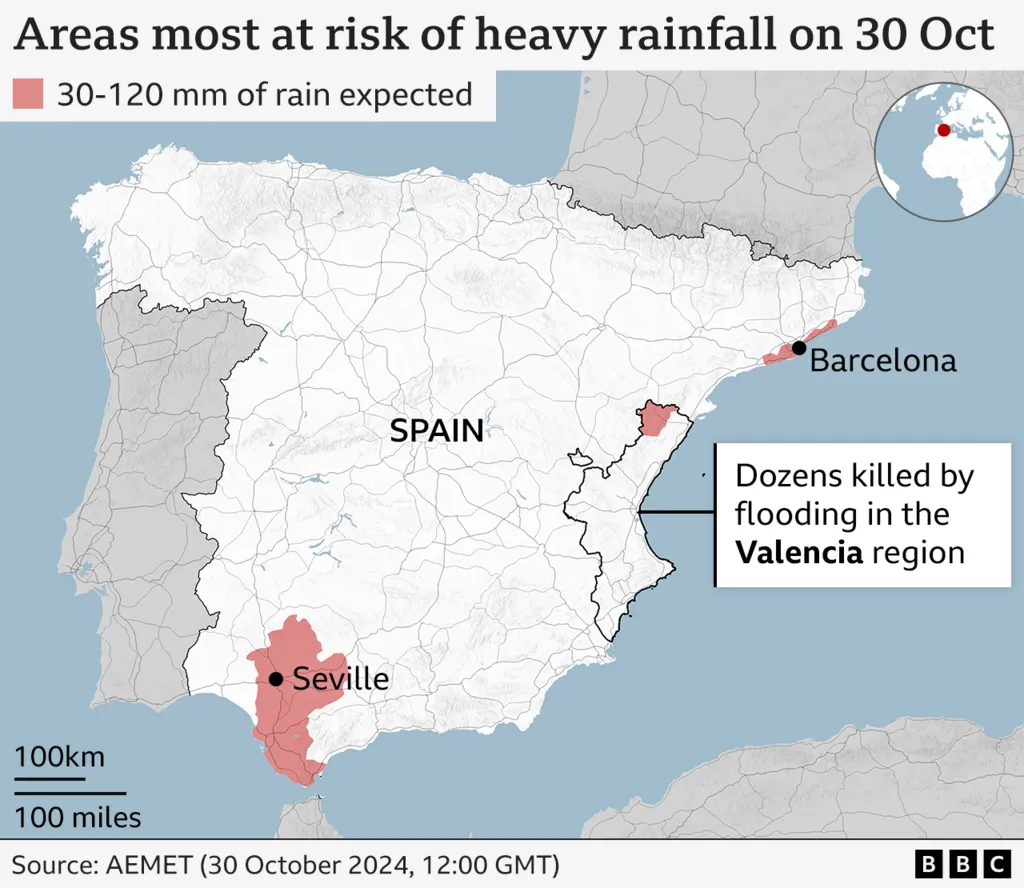
Spain is facing its most devastating flooding disaster in decades, with a staggering 95 lives lost and many more missing. The eastern province of Valencia and surrounding areas were ravaged by torrential rains, triggering flash floods that swept away bridges, buildings, and everything in their path ¹. The sheer force of the floods forced people to seek refuge on rooftops or cling to trees to stay alive.
Prime Minister Pedro Sánchez has declared a three-day national mourning period as the crisis continues to unfold, with rescue efforts hindered by the extreme conditions. The government fears the death toll will rise, citing numerous missing persons.
Eyewitnesses describe the horrors of the floods, likening them to a “tsunami.” Scientists point to climate change as a contributing factor to the disaster’s severity.
The Valencia region has borne the brunt of the tragedy, with 92 reported deaths. Additional fatalities were recorded in Castilla-La Mancha and Málaga, including a 71-year-old British national who succumbed to injuries after being rescued.
This disaster marks Spain’s worst flooding-related loss of life since 1973, when at least 150 lives were lost in the nation’s worst-ever floods.
In a national address, Prime Minister Sánchez urged citizens to remain vigilant, promising a comprehensive recovery effort. “The whole of Spain weeps with you… we won’t abandon you,” he assured the victims.
The town of Chiva, near Valencia, received an astonishing year’s worth of rainfall in just eight hours, according to national weather agency Aemet.
Survivors recounted their terrifying experiences, including sudden surges that transformed streets into rivers, catching motorists off guard. One young survivor, Guillermo Serrano Pérez, described the water rushing down a highway “like a tsunami,” forcing him and his parents to abandon their car and seek safety on a bridge.
Witnesses described a dramatic scene where drivers on the motorway joined hands to form a human chain, escaping a torrent of water by fleeing along a raised central reservation. Patricia Rodriguez, 45, recounted to El País newspaper: “Thank goodness no one slipped, or they would have been swept away by the current.”
“Thank goodness no one slipped because if anyone had fallen, the current would have dragged them away,” Patricia Rodriguez, 45, told El País newspaper.
Consuelo Tarazon, Mayor of Horno de Alcedo, near Valencia, described the rapid rise of water levels: “The currents were so quick – and we called the emergency services who started rescuing some people who had water up to their necks”.
The devastating floods have sparked widespread criticism, with many accusing disaster relief authorities of responding too slowly. This delay meant people couldn’t escape roads or seek higher ground.
The civil protection agency has faced criticism for issuing an alert at 20:15 local time on Tuesday, hours after Chiva and other towns had already been flooded.
Valencia’s regional government is under fire for scrapping the Valencia Emergency Unit. Established by the previous government, this unit was designed to tackle natural disasters like flooding and wildfires.
The decision to disband the emergency unit has drawn fierce criticism, with many questioning the regional government’s preparedness for disasters.

As the region begins the recovery process, questions linger about the effectiveness of Spain’s disaster response systems and the measures needed to prevent such tragedies in the future.
Spain has deployed over 1,000 troops to aid in rescue efforts following devastating floods, but many crews remain isolated.
European Union Chief Ursula von der Leyen has activated the Copernicus satellite system to enhance coordination among Spanish rescue teams.
Spain’s Defence Minister Margarita Robles described the widespread flooding as an “unprecedented phenomenon.”
The downpour has subsided in central-east Spain, but weather officials caution that the rain is shifting northeast toward Catalonia.
Weather warnings have been issued across several regions, urging people to prepare for potential floods and seek shelter.
Climate change contributes to the increased likelihood of extreme rainfall, as a warming atmosphere intensifies precipitation.
Researchers attribute the intense rainfall to a “gota fria,” a natural autumn and winter phenomenon in Spain.
“With every fraction of a degree of fossil fuel warming, the atmosphere can hold more moisture, leading to heavier bursts of rainfall,” said Dr Friederike Otto, from Imperial College London, who leads an international group of scientists who try to understand the role that warming plays in these type of events.
“No doubt about it, these explosive downpours were intensified by climate change.”
The world has already warmed by about 1.1C since the industrial era began; temperatures will continue rising unless governments make steep cuts to emissions.
Source: https://www.bbc.com/








